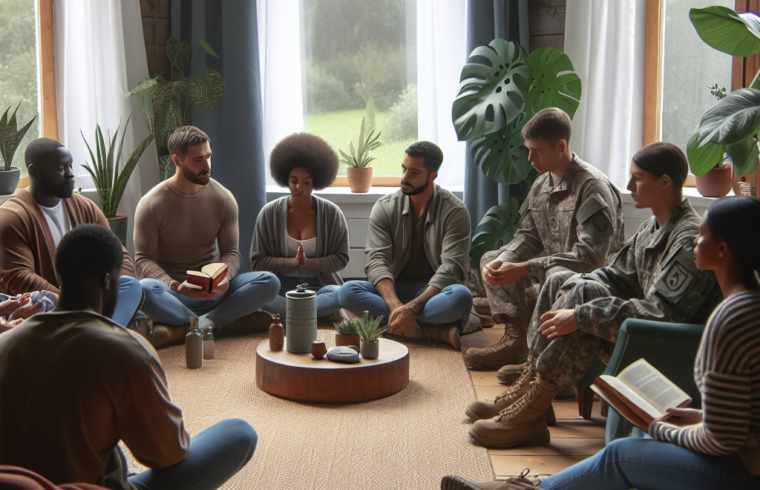==> Thank you for reading this post! Click Here If you are looking for support and Victory over PTSD.
Understanding Military Trauma
What is Military Trauma?
Military trauma is a term that resonates deeply with many veterans. It often stems from the intense experiences faced during service, be it in combat or in challenging environments. Trust me, it’s not just about the physical injuries; emotional scars can run just as deep, often manifesting in the form of PTSD, anxiety, and depression. Coming to terms with what we’ve been through is a crucial first step in the healing journey.
Recognizing the types of trauma we might face is essential. For instance, for some, it could be the noise of gunfire or the sights of destruction that trigger feelings of dread. For others, it’s the loss of comrades that leaves an everlasting impact. Understanding these aspects helps us normalize the feelings we experience and opens the door to seeking help.
It’s vital for veterans and their families to engage in conversations about military trauma. Encouraging dialogue can lift the stigma and create a supportive environment, allowing veterans to feel validated rather than isolated in their experiences.
Seeking Professional Help
The Importance of Therapy
One of the most effective ways I’ve found in my healing journey is professional therapy. Working with counselors who specialize in military trauma can profoundly impact the healing process. They offer a safe space to explore feelings and develop coping strategies. Honestly, it’s refreshing to talk to someone who gets it.
Therapies can vary, with options like Cognitive Behavioral Therapy (CBT) or Eye Movement Desensitization and Reprocessing (EMDR) showing great results. Each approach tailors to individual needs, helping to process and reframe the traumatic experiences that haunt us.
Moreover, therapy is more than just talking; it’s about developing skills to manage the daily struggles. Stress management techniques, mindfulness exercises, and deep-breathing strategies are just a few tools that can empower veterans to reclaim their lives.
Building a Support Network
Engaging with Community
During my path to healing, I found that connecting with fellow veterans created a strong support network. There’s something uniquely comforting in sharing stories and struggles with someone who truly gets what you’ve been through. It’s like a brotherhood that helps break down the walls of isolation.
Joining veteran support groups or participating in community events can foster understanding and companionship. Whether it’s through local meet-ups, online forums, or organizations like the VFW or American Legion, being part of a community can be incredibly uplifting.
It’s not just about sharing the tough times; it’s also about celebrating victories, big and small. Having a crew to cheer you on can do wonders for your confidence and motivation, reinforcing that healing is absolutely achievable.
Embracing Holistic Approaches
Physical Activity & Wellness
Integrating physical activity into my routine has been a game changer. Whether it’s running, yoga, or even hiking, staying active contributes not only to physical health but also mental well-being. There’s something about a good workout that clears the mind and brings a sense of accomplishment.
Get Support and Help with Recovery! Visit us for more Information and Support
Mindfulness practices, such as meditation or deep breathing exercises, also play a crucial role. Taking time to slow down and focus brings clarity and reduces stress, helping combat the weight of anxiety. It’s about finding peace in the chaos.
Nutrition plays its part too. Eating a balanced diet fuels our bodies and minds, enhancing our ability to cope with stressors. Making conscious choices about what we put into our bodies reflects the respect we have for ourselves on this healing path.
Ongoing Personal Development
Setting Goals for the Future
As I continued my healing journey, setting personal goals became essential. Spanning from career aspirations to personal growth ambitions, having something to strive for reignites hope and motivation in our lives. It’s about envisioning a future that’s within reach, despite the shadows of the past.
Writing down goals and breaking them into smaller, actionable steps can help track progress. Celebrate every little win; it’s about building momentum that propels us forward. Adopting a ‘growth mindset’ allows for flexibility and encourages resilience when setbacks occur.
Lastly, continuing education and self-improvement can nurture our sense of identity. This engagement not only keeps our minds sharp but also fosters connections with others who share similar interests and aspirations.
FAQ
1. What is military trauma?
Military trauma refers to emotional and psychological wounds experienced by veterans due to their military service. It can manifest in various ways, including PTSD, anxiety, and depression.
2. How important is therapy in healing from military trauma?
Therapy is crucial; it provides a safe space to explore feelings, develop coping strategies, and process traumatic experiences with professionals who understand military challenges.
3. How can I build a support network as a veteran?
Engaging with fellow veterans through support groups, online communities, or local events can help create a strong support system. Sharing experiences fosters understanding and camaraderie.
4. What holistic approaches can aid in healing?
Holistic approaches like physical activity, mindfulness, and nutrition have significant impacts on both physical and mental well-being, complementing traditional therapeutic methods.
5. Why is personal development important for veterans?
Personal development keeps veterans motivated and focused on their goals. Setting and working towards achievable objectives can provide a renewed sense of purpose and direction.













